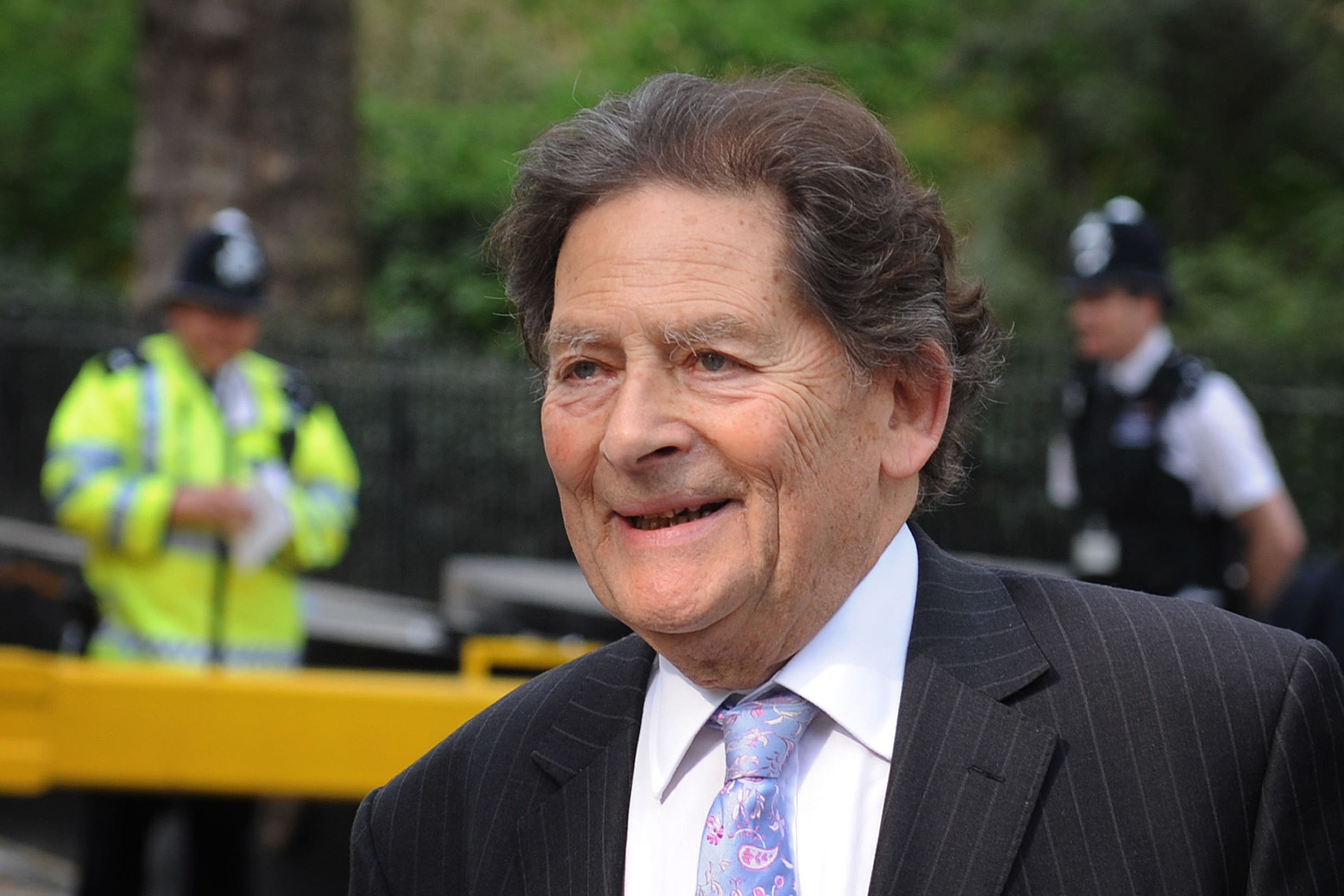Thatcher-era chancellor Nigel Lawson dies at age of 91
MPs pay tribute to ‘a fearless and original flame of free-market Conservatism’
Your support helps us to tell the story
From reproductive rights to climate change to Big Tech, The Independent is on the ground when the story is developing. Whether it's investigating the financials of Elon Musk's pro-Trump PAC or producing our latest documentary, 'The A Word', which shines a light on the American women fighting for reproductive rights, we know how important it is to parse out the facts from the messaging.
At such a critical moment in US history, we need reporters on the ground. Your donation allows us to keep sending journalists to speak to both sides of the story.
The Independent is trusted by Americans across the entire political spectrum. And unlike many other quality news outlets, we choose not to lock Americans out of our reporting and analysis with paywalls. We believe quality journalism should be available to everyone, paid for by those who can afford it.
Your support makes all the difference.Former Conservative chancellor Nigel Lawson has died at the age of 91. Lawson served in numerous cabinet positions in the government of Margaret Thatcher but was best known for his role as chancellor during the 1980s.
Father to six children – including TV cook Nigella Lawson and journalist Dominic – he represented the constituency of Blaby from 1974 to 1992, before sitting in the Lords until his retirement in December.
Mr Lawson was closely associated with the economic reforms and privatisation policies which marked Thatcher’s premiership and significantly reshaped Britain.
Prior to entering politics aged 42, he worked as editor of The Spectator. He had also worked as a journalist for the Financial Times and the Sunday Telegraph.
Rishi Sunak, Boris Johnson and David Cameron were among prominent Tory figures to pay tribute to Lawson on Monday night after news broke of his death.
Mr Johnson described the Eurosceptic as “a fearless and original flame of free-market Conservatism” and a “prophet of Brexit”.
“He was a tax-cutter and simplifier who helped transform the economic landscape and helped millions of British people achieve their dreams,” said Mr Johnson. “He was a prophet of Brexit and a lover of continental Europe. He was a giant. My thoughts and prayers are with his family.”
Mr Sunak said that “one of the first things I did as chancellor was hang a picture of Nigel Lawson above my desk”, describing him as “a transformational chancellor and an inspiration to me and many others”.

Former Tory prime minister David Cameron said: “Nigel Lawson was a giant of British politics, right in the heart of the engine room of Margaret Thatcher’s great reforms – and providing so much of the intellectual backing for what needed to be done at the end of the 1970s.”
Chancellor Jeremy Hunt said Mr Lawson was “a rarity amongst politicians – someone who transformed our thinking as well as transforming our economy”, adding that he had “inspired all his successors”.
Liz Truss said: “Incredibly sad to hear of the death of Nigel Lawson. A true giant of 20th century politics who as chancellor famously sought to abolish at least one tax at every Budget. His time at the helm of the Treasury was transformational.”

Foreign secretary James Cleverly described Lawson as “a true statesman”, adding: “His contributions to this nation will not be forgotten.”
Sajid Javid, another former Tory chancellor, described Lawson as “one of Britain’s greatest public servants, especially as chancellor”.
Lawson was active in Conservative politics “until very recently”, said Tory party chairman Greg Hands, adding that he would “be remembered for his clarity of thinking, commitment to free market economics and willingness to challenge orthodoxies”.
He served as financial and then energy secretary before Thatcher appointed him chancellor in 1983, a role he held until 1989, when his relationship with the prime minister soured and he resigned over a row with Thatcher and her economic aide Sir Alan Walters over the Exchange Rate Mechanism.
While he enjoyed a period of economic growth during his tenure dubbed the “Lawson Boom”, his policies were eventually blamed for pushing the UK into the inflationary spiral which ultimately led to a recession and the Black Wednesday crisis of 1992 – the same year Lawson moved to the Lords.

He later told the BBC that he believed the 2008 financial crash had been an “unintended consequence” of his “Big Bang” deregulation of the City of London’s financial markets.
In 2016 he became chairman of Vote Leave, which saw the successful campaign for the UK’s exit from the EU at that year’s referendum. Mr Lawson described Brexit as a “historic opportunity” to finish what Thatcher had started.
Lawson had remained vocal after stepping back from frontline politics, continuing to campaign for Brexit as president of the Conservatives for Britain pressure group.
A sceptic of man-made climate change, he also acted as founding chair of the Global Warming Policy Foundation, which has lobbied against policies to avert climate breakdown such as net zero.
He finally retired from the Lords in December, ending a parliamentary career spanning nearly 50 years.





Join our commenting forum
Join thought-provoking conversations, follow other Independent readers and see their replies
Comments